The greatest compliment I can give to Palworld is that it lights up my brain in the same way a modern Assassin’s Creed game does. It taps into the same checklist clearing compulsion that saw me spend over 100 hours in both Odyssey’s Ancient Greek archipelago and the Viking open world of Valhalla – only instead of chasing map icons that take you down weird sidequest rabbit holes that riff on Fenton the (sheep)dog, or gobbling up story events just so you can make googly eyes at every warm-blooded human in a ten mile radius, Palworld hooks you in with its enormous catalogue of base building tasks. Not catching the 100+ Pal monsters roaming around its mysterious islands, but crafting the perfect sweatshop to put them to work in. It’s one of those, « I’ll just add this furnace so I can craft some ingots that will let me make a cooking pot to level up my base, but wait, now I need some ore to make those ingots, and oh god, I’ve just spent seven hours doing not very much at all, have I? »
To be clear, I’ve had those same dread-filled, « What the heck have I just spent my entire weekend on? », epiphanies when I’ve played those aforementioned AssCreed games, too. I know full well that there’s no real reason why I spend such vast stretches of time with them, and that much of their map-clearing has considerably less nutritional value, say, than pursuing their core story quests and calling it a day. They’re tasks for the sake of having a task a lot of the time, a breadcrumb trail of dopamine dings that make it feel like you’re accomplishing something, when really all you’re doing is pointless busywork. And yet. There I go, doing it all anyway, despite myself.
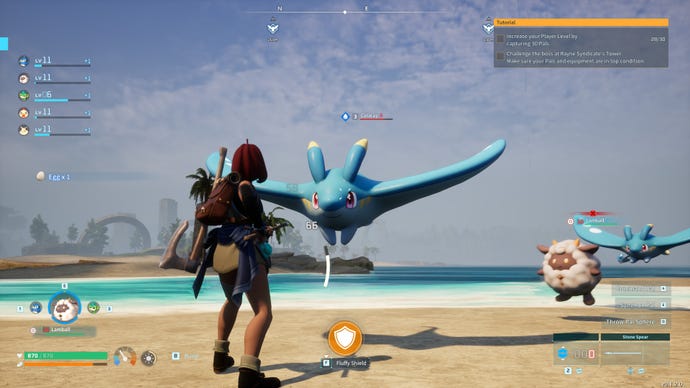
Palworld scratches this exact same itch with its base building, keeping you stuffed with a long list of objectives so you’ve always got something to work toward. Once you’re out of the tutorial, these are drip-fed to you via your Palbox, the second thing you’re taught to build after the all-important crafting bench. This not only functions as your centralised Pal storage, a bit like Pokémon’s PC Boxes, but it’s also the place where you’ll assign Pals to your party, and level up your base. And the higher base level you have, the more Pal workers you’ll have under your thumb to craft, farm and build the stuff you need faster and more efficiently. Thus, the checklist cycle begins, and Palworld quickly settles into that familiar rhythm of gaining EXP and Technology points to unlock the requisite contraptions from your Technology tree, the raw materials to build them with, and as well as other machines to process some of those ingredients into more advanced building blocks. Rinse, repeat, and lo and behold, another five hours have gone by.
This is the core of what Palworld actually is. Despite its cuddly-looking (and just about legally distinct) Pokémon-esque creatures being plastered front and centre in both the title, art and general hubbub about the game, Palworld isn’t really that interested in being an actual Pokémon-like, or at least not in the same way as games like Cassette Beasts, Coromon or TemTem are. Sure, you can call upon Pals in battle to fight alongside you, and you can, via special pinecone doodads, teach them specific moves to add to their very limited skill set. Eventually, you can also set about breeding them, but the focus is never on the Pals themselves. Rather, it’s mostly about what those Pals can do for you and your base, and how they can best service those needs via their stats, abilities and traits.
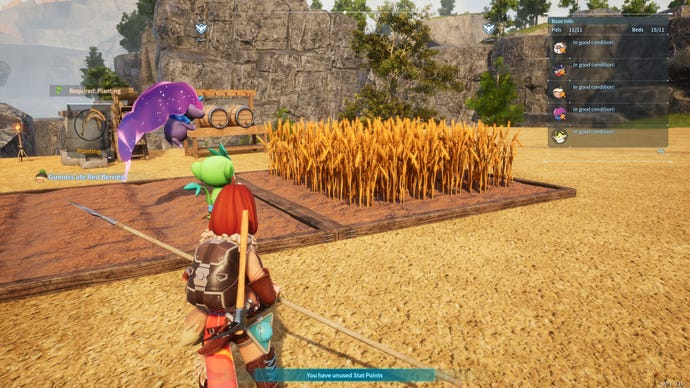
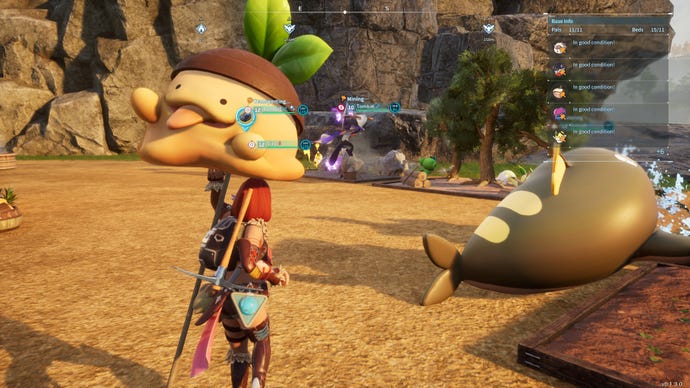
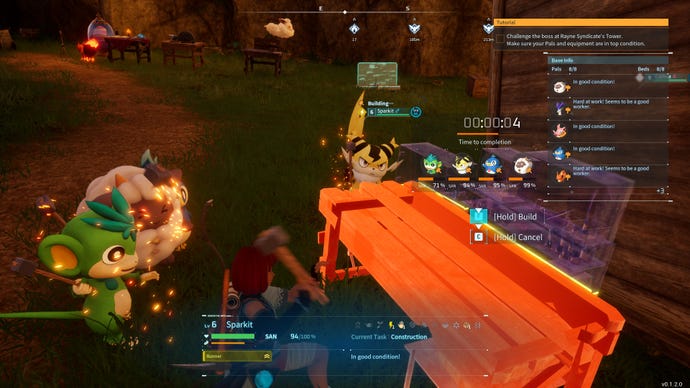

It’s a small, but important distinction, and one that puts Palworld in better company with the likes of Monster Hunter and Wild Hearts. Well, sort of. In battle, for example, the attention remains centred on you as a player, giving encounters the same kind of frenzied pace and ‘anything can happen anywhere’ action as Capcom’s premier beast slayer. But even then, Palworld still feels like a poor imitation. Despite an array of craftable weapons at your disposal, they all boil down to the same single mouse or button press. There are no attack combos to use or classes to master, and the only real ‘move’ you have is a dodge roll.
Thus, battles end up following the same repetitive pattern as its base building. Each fight feels exactly the same as the last, and even boss battles become dreary slogs to grind those HP bars down to zero. There’s no escalation in the sense of drama or excitement, and no slathering jawlines or stumbles of exhaustion as your quarry gets beaten into submission. More often than not, fights descend into such a hectic bombardment of conflicting health bars and Pal attack effects, that joining the fray quickly becomes a madman’s game. Instead, you’re much better off sticking to the sidelines, either sitting them out entirely while your Pals do the hard work for you, or, if you’re feeling generous, pelting your opponents’ spongey bodies with arrow after arrow (and later bullet after bullet) from afar.
It doesn’t matter what Pals you’ve got fighting alongside you either. You see, Pals operate independently of the player, using their small crop of abilities on whatever object – human or Pal alike – happens to be in front of them. Only a select few let you exercise any direct control over them (once you’ve crafted the necessary gloves and harnesses to hoik them up under your arm and squeeze them like an elemental bagpipe, that is), and even then it’s mostly just a single special attack that’s governed by an extensive cooldown period. The rest of the time, it’s back to taking potshots with your bow. And again, the resulting mess of everything onscreen still makes you want to take a backseat until everyone’s finished clobbering each other.
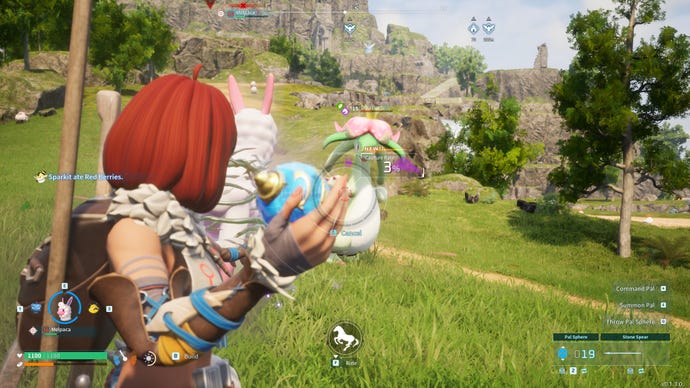
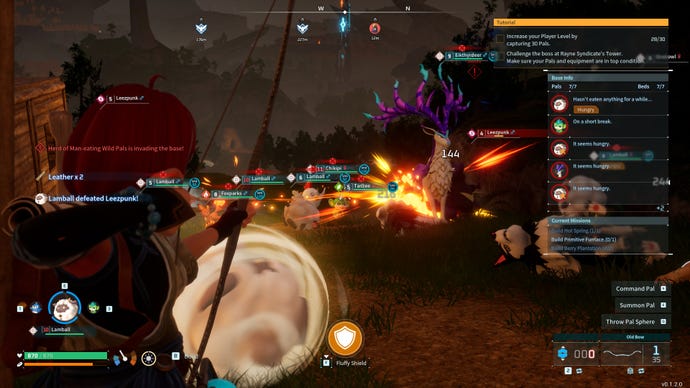

The only way to fully control the battlefield is to ride one of your (again, select few) mount Pals into the fray, as that puts a whopping three (3) attack commands at your fingertips, and thus finally some variation in how you tackle enemies. But just as your pulse starts racing with excitement, Palworld manages to kill that feeling almost straight away thanks to its unwieldy controls. Aiming and manoeuvring your Pal’s attacks is a maddening affair when swarms of creatures half your size are coming at you from all angles, and yet again, it’s simply more efficient (and better for your health) to get off your Pal, head for the hills and let them do their thing. That’s because death in Palworld means you’ll drop all your stuff on the spot, then respawn in nothing but your pants at one of few pre-ordained checkpoints.
Capturing Pals is worse still. On the rare occasion that I manage to identify which of the many red health bars belongs to the monster I actually want to catch, 90% of the time my Pal companion will simply wallop them into the afterlife before I’ve even whipped out my Pal Sphere (and in the other 10%, I’ll throw the damn ball, the Pal will break out and then get walloped before I can throw another one). Did I also mention that you lose every ball you throw, regardless of whether it hits something or not? That’s minutes of crafting work down the drain in a simple mis-tap, and unless you’ve got the wherewithal to recall your Pal at critical moments (which is tricky when you’ve got ten turtles all dosing you with bubble beams), or are ultra-quick with finicky keyboard commands (hitting 4 to bring up the Pal’s menu dial and selecting ‘DO NOT ATTACK, FOR THE LOVE OF GOD’ – a nigh on impossible task in the heat of battle), even trying to play it like a regular Pokémon-like is often fraught with frustration.
There are moments, of course, where the fog of confusion clears, Pals are easily caught, and everything just about holds together enough to keep you moving forward. Heck, I still feel uncomfortable with the way it so relishes inflicting extreme violence on its innocuous wildlife, but I’ll admit that I’ve become numb to it over time, my defences ground down by the need to ding those never-ending checklists. I know it’s as mindless as it comes, but once you get into the swing of those upgrade chores, Palworld does just a good enough job of dangling its dopamine carrots in front of my face that it will string me along for hours, even when playing alone.

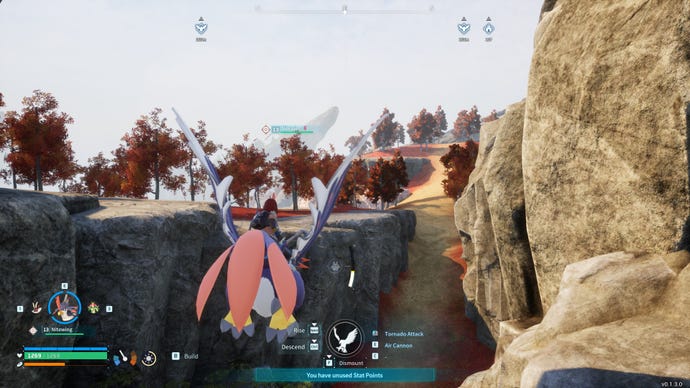
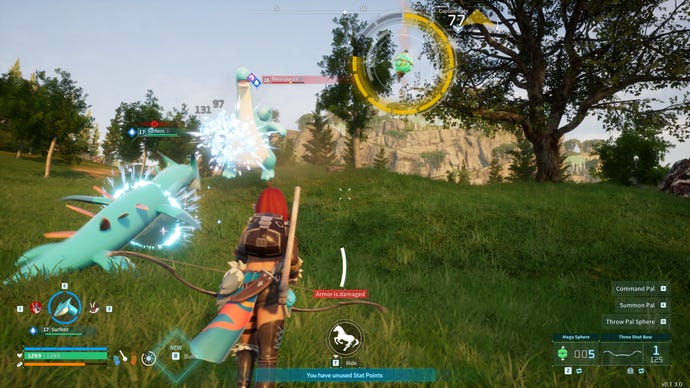
You can quite easily leave your base to hum along in your absence, too, as your Pals will continue beavering away headbutting logs, punching rocks, farming your berry plots and keeping themselves fed and watered all without your supervision. Although I find it depressing that their core stat in worker bee mode is simply « Sanity », as if nothing else matters or is even vaguely important in maintaining a healthy worklife balance. Naturally, you don’t want their sanity levels to drop too low from overwork, but while there are buildings you can construct to keep them vaguely happy, the smoothest path to dealing with terminal grumps and slackers (or Pals who repeatedly manage to clip through the environment and almost starve themselves in the process) is to simply whack them back in the Palbox and swap them out for another. Because that’s what these dumb creatures are at the end of the day: entirely replaceable, and more fodder for the base building machine.
That’s why, deep down, I know Palworld is essentially junk food of the highest order. There’s no real joy or soul to be found here. All that’s left is another neuron firing off in my brain, clapping its hands in a daze of stupefied glee. For as soon as I take my eyes off those carrots and start looking beyond the boundaries of my base, the rest of Palworld feels as tired and stale as its repetitive combat. It is, of course, still in early access at the moment, and future updates may well fill in some of the gaps it’s currently lacking. But there are deeper flaws present here that I’m not sure can be fixed by fleshing out a few things.
For instance, the world of Palpagos Islands is, frankly, an empty hodgepodge of assets thrown together in a blender. Autumnal forests will butt up against beaches, mountains and grassy plateaus in what feels like the same 100m radius, and the Pals themselves never feel like they belong to particular habitats. It all routinely fails to ignite any sense of wonder or curiosity about what lies beyond the next hill, mostly because there are either too many trees blocking the view, or there’s just… nothing tempting you further toward the horizon. And on the few occasions you do make it to a vaguely unusual-looking landmark or mountaintop, there’s seldom anything there to make it worth the effort – not even a knock-off Breath Of The Wild Korok seed for your trouble.
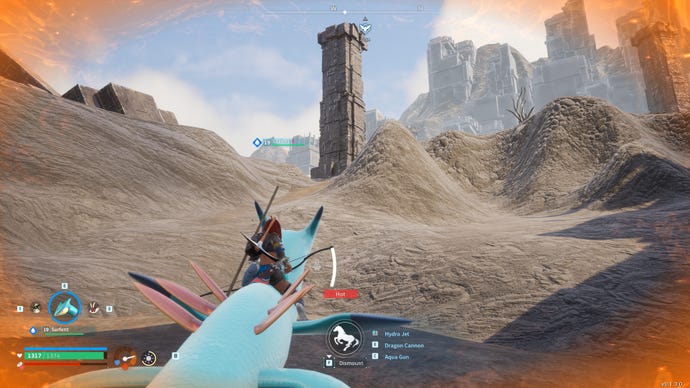
It’s all aimless, because once you take away the muscle of Palworld’s base building, you’re left with a skeleton that can barely prop itself up, let alone provide any forward momentum. Sure, there’s that mysterious tablet from the start of the game spouting some cryptic nonsense about how ‘the towers hold the key’ or some such (the towers effectively being Palworld’s version of Pokémon’s gym leader battles), but once you complete the first tower to round off the tutorial, they’re barely mentioned ever again. There’s no wider story beats chivvying you along to tackle this tower or that one, and when the world’s so bland and uninviting, the desire to explore for the sake of adventure is practically non-existent.
Everything’s in service of building your base in Palworld, and if that’s where you get your kicks from, then by all means have at it. There’s room in this world for junk food as well as fine cuisine, and sometimes we all need a bit of simple satisfaction in our lives. But right now, there’s very little else to recommend Palworld, least of all its ‘take take take’ mentality and the way it so brazenly frames everything as a tool to exploit for your own gain. Maybe Assassin’s Creed is guilty of that, too, as well as Monster Hunter, Pokémon and all the other games Palworld’s so clearly riffing on. The difference, I think, is one of attitude and ambition, because for all their respective monster mauling, those games still feel alive in ways that Palworld simply doesn’t at the moment. They have the heart and presence to laugh at their own silliness, but Palworld just feels a bit dead behind the eyes. All that exists is the infernal checklist.
This review is based on a retail build of the game provided by developers Pocketpair.









